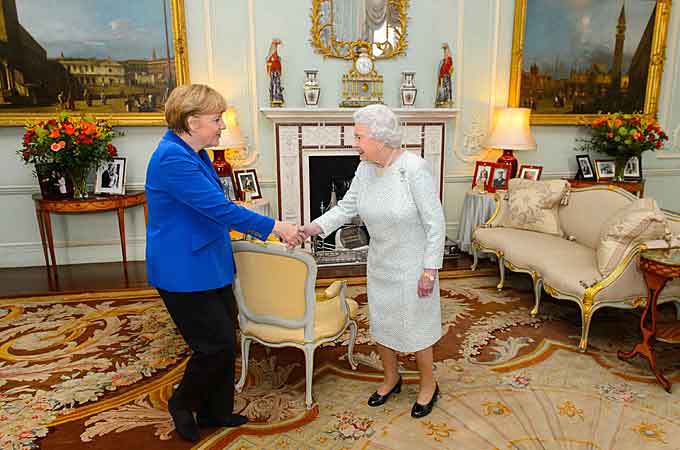Merkel addresses Britain’s parliament
German chancellor says in address to both houses she does not support fundamental EU reform as demanded by UK’s Cameron.

German Chancellor Angela Merkel has told David Cameron, UK prime minister, that she does not support the kind of fundamental reform of the European Union he wants, but said Britain should stay inside the bloc to help make it more competitive.
In a speech on Thursday to both houses of Britain’s parliament – only the third time a German leader had spoken there since the second world war – Merkel ruled out the prospect of a far-reaching overhaul of the bloc’s treaties, indicating that she was open to modest reforms only.
“Some expect my speech to pave the way for a fundamental reform of the European architecture which will satisfy all kinds of alleged or actual British wishes. I am afraid they are in for a disappointment,” Merkel, the leader of the EU’s most powerful state, said in English.
“Others are expecting the exact opposite and they are hoping that I will deliver the clear and simple message here in London that the rest of Europe is not prepared to pay almost any price to keep Britain in the European Union. I am afraid these hopes will be dashed,” she said.
In London for a one-day visit, Merkel was speaking at a time when uncertainty about Britain’s future in the EU is rising because of a promise by Cameron to offer Britons a referendum on whether to leave the 28-nation bloc or not, if he wins a national election next year.
Balancing act
Under pressure from eurosceptics in his Conservative party and from the anti-EU UK Independence Party (UKIP) in the run-up to European elections in May and next year’s national vote, Cameron has promised to try to reshape Britain’s EU ties first.
He has not spelt out all the reforms he wants, but made clear he wants to curb freedom of movement for people from poorer new EU member states, combat pan-EU “welfare shopping”, cut EU red tape and improve competitiveness.
Switching between her native German and English, Merkel delivered her speech in one of the British parliament’s most ornate rooms, with Cameron and the rest of the country’s political elite sat in the front row hanging on her every word.
 |
| Merkel, who took tea with the Queen on Thursday, represents the EU’s biggest economy and most powerful state [AFP] |
Hers was a delicate balancing act: To be seen to be giving Cameron, a centre-right ally, some support in his quest to win back powers from Brussels, while making it clear that her backing went only so far.
Merkel praised Britain for its role in safeguarding freedom in World War II, for its pivotal role in transatlantic relations, as an important German ally, and a vital member of the EU.
“We need a strong United Kingdom with a strong voice inside the European Union. If we have that we will be able to make the necessary changes for the benefit of all,” she said.
She indicated she supported Cameron’s bid to clamp down on abuse of the EU’s freedom of movement rules when it came to welfare benefits and partially backed his drive to rein in the European Commission.
She said Britain would have a chance – along with everyone else – to submit proposals for reform once deeper integration of the eurozone had happened.
“It is not a piece of cake, it will be a lot of work,” Merkel said.
“If we want Britain to remain in the European Union, which is what I want, if one also wants a competitive union that generates growth, one can find common solutions.”
‘Economic strength’
Proposals would be judged on whether they bolstered the euro’s “economic strength,” Merkel said.
In comments that will please Cameron, who later called her speech “excellent”, she said she thought that EU red tape should be cut, that unnecessary EU laws should be junked, and that the EU principle that member states do things at national level where that makes more sense should be respected.
A joint news conference after her speech was awkward, however.
Merkel ignored a reporter’s question asking her if she regarded Cameron as her “naughty nephew”, appeared unimpressed with another asking her if she was “the Queen of Europe”, and a joke by Cameron about the European Parliament fell flat.
After her address to parliament, Merkel had lunch with Cameron in his offices before taking tea with Queen Elizabeth.
Merkel’s visit is seen as a test of how far Cameron is likely to get in persuading the rest of the EU to sign up to his reform ideas, since Germany is the bloc’s most powerful state and its biggest economy.